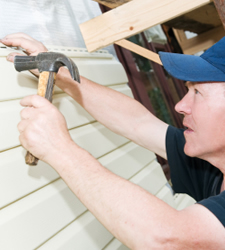 Are you interested in installing new vinyl on your home? If you are ready to give your home a new look or if you need to bring it up-to-date, installing new vinyl siding can be an excellent option.
Are you interested in installing new vinyl on your home? If you are ready to give your home a new look or if you need to bring it up-to-date, installing new vinyl siding can be an excellent option.
Before you decide to install residential vinyl siding, however, it is important to learn more about this type of siding and how to choose the siding that is right for you.
Creating a New Reputation
While vinyl siding once had a reputation for being hollow and somewhat flimsy, new technology has helped it advance in many ways.
Whereas it would once become saggy over time and could get damaged by storms and the sun, today’s vinyl siding is less prone to damage.
Today, vinyl siding is not only far more resistant to wear and tear, but it is less likely to fade as well. Although vinyl siding does have a shorter lifespan than some other siding options, it is still a long-lasting option when properly maintained.
Furthermore, thanks to the wide variety of colors, textures and features available with vinyl siding, you can create virtually any look you desire when you choose vinyl siding.
Choosing the Best Vinyl Siding
While vinyl siding has come a long way over the years, there are still differences between high-quality and low-quality vinyl siding.
If you want to get the best vinyl siding possible, look for the thickest siding you can find. This way, you will significantly decrease the chances of it cracking, denting or splitting open.
Not only is this important in terms of making your house look good, but keeping your siding in good condition is also an essential part of protecting your home.
If pieces of your siding becomes split or broken, it can damage the exterior wall of your home as well as your interior walls if water is allowed to seep through.
Find a Vinyl Siding Contractor
Although some homeowners do choose to install their vinyl siding on their own, most prefer to leave the job to a professional.
If you plan to hire a siding contractor, be sure to look for a contractor with the proven experience and knowledge necessary to get the job done right. You can do this by asking for references, viewing the contractor’s portfolio and talking to your friends and family about the contractors they have hired.
You should also make sure the contractor has liability insurance and worker’s compensation coverage. Otherwise, if one of the workers is injured while working on your property, you may be held liable for the expense.



Speak Your Mind